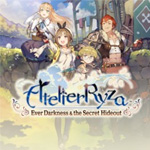A New Recipe.
As someone who has followed the Atelier series progression through three generations of consoles, I’ve always enjoyed them. The series emphasized creative crafting through alchemy with charming casts of characters and light hearted storylines and they delivered, most of the time. Still, the status quo can only be sustained for so long before one loses interest, and it has been time for the series to move on from its current formula to a more unfamiliar territory.
As if in reaction to this general feeling of the fan base, the team at Gust decided to take more than a few chances with Atelier Ryza, resulting in a title that feels both new and familiar at the same time.
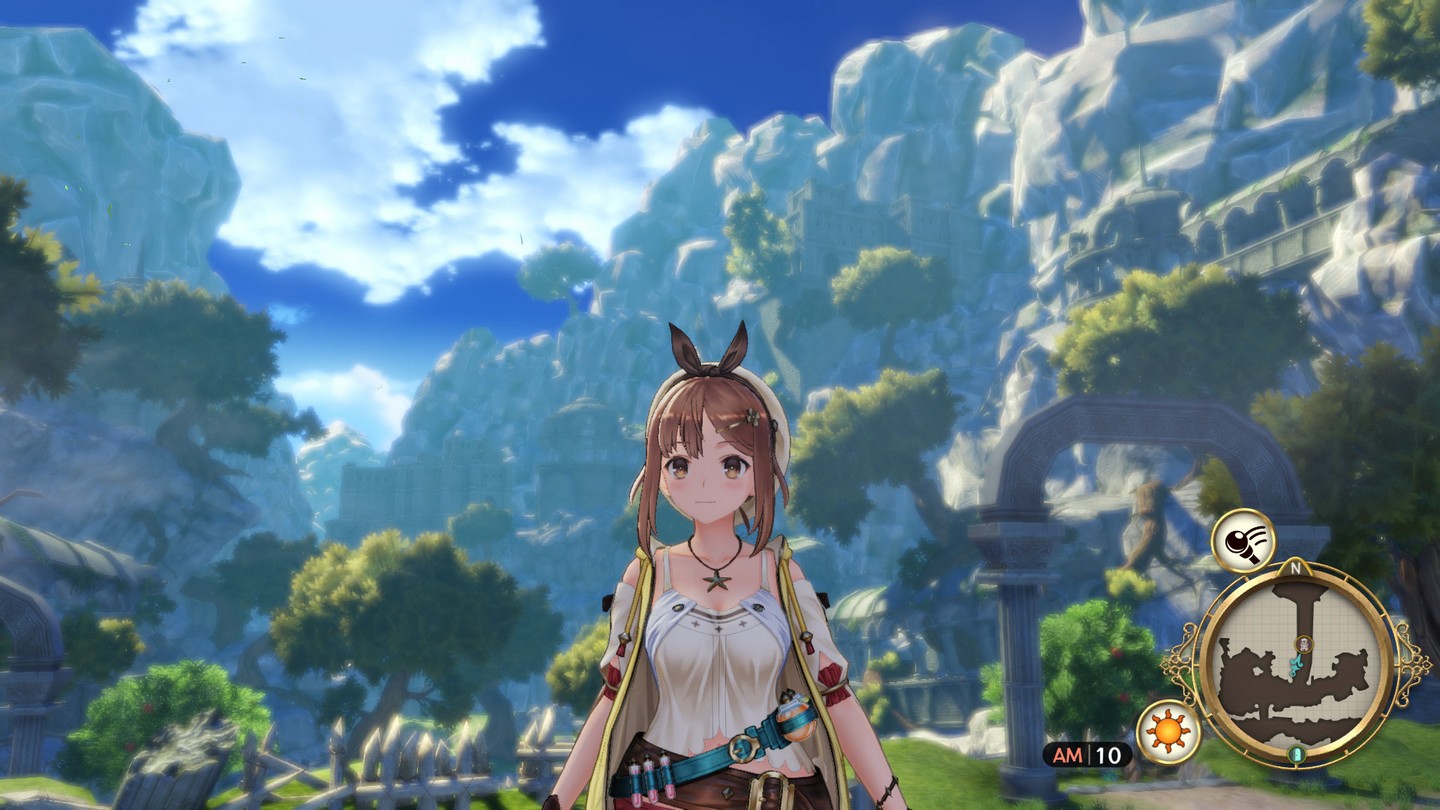
Ryza has become a darling for the fan artists for… reasons.
MSRP: $59.99
Platforms: PS4, Switch, PC
Voice Acting Selection: JPN
Length: 40~ Hours
As a child growing up on a farm, it was always expected that Ryza would take up the family business. However, Ryza had other plans in mind as all she could ever think about was escaping her boring life and going on grand adventures with her friends. One day, she decides to take action and goes to explore an island with her childhood friends where she meets an alchemist and his traveling companion, changing her life forever.
As is typical for Atelier games, the world and overarching plot present here is a colorful, laid back one and felt very much like a coming of age story as Ryza and her friends go from mischievous troublemakers to valuable members of their tight-knit community. However, despite finding the characters to be fine, I never felt like I got too invested in their trials and tribulations. Ryza’s embrace of alchemy, Lent’s desire to become stronger and Tao’s thirst for knowledge were all defining character traits I’ve seen explored better in previous Atelier titles. The small skits involving the denizens of the town felt lifeless with little charm or humor, as did the various miscellaneous side quests which may have been better left as a guild menu like it was in previous titles.
It also doesn’t help that there are paid DLC character stories for each of the main party members (minus Ryza) that might have helped endear them to me, but I wouldn’t know since I don’t want to support DLC like that. I didn’t support it for FFXV and I won’t do it here either.
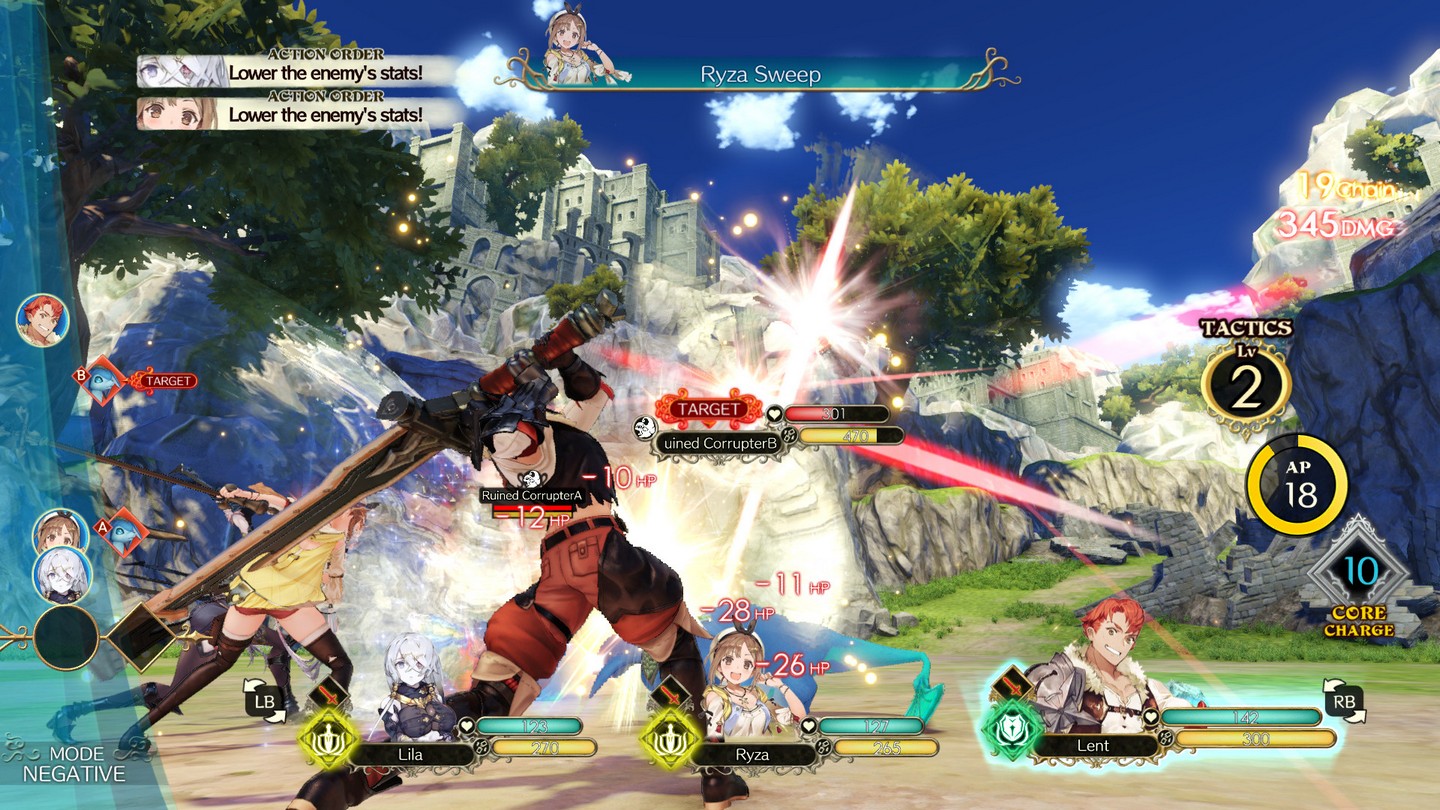
The combat is radically different from the usual turn-based affair.
While the story and characters failed to impress, the brand new combat engine was a breath of fresh air. Instead of standard turn-based combat that the series has become synonymous with, battles now take place in active time. An encounter begins by attacking or running into an enemy on the map, and if I had the initiative by attacking the enemy on the map, I would start with a specific advantage based on the tool I used to strike them with. The flow of battle was controlled by the use of AP, which increased as I used normal attacks, and by spending AP I could use special attacks and items. Investing a certain amount of AP would allow me to increase the tactics levels of the current encounter, increasing all of my abilities and their effectiveness.
When I wasn’t in direct control, the CPU would do an admirable job of controlling the other two characters based on the strategy I had setup, which could be changed at any time given the situation. All combatants on the field had a turn order determined by their speed and the delay of their previous actions, but since all actions took place immediately when they were able, everything moved very quickly. I could spend some AP to take a turn which actually stopped time while I was able to make a selection, but outside of that, things moved at a fast pace whether you were ready or not.
Switching between characters to unleash specific moves, thinking ahead to see when I should spend all my AP to raise my tactics level while enemies were relentlessly attacking felt hectic but quite fun at the same time.
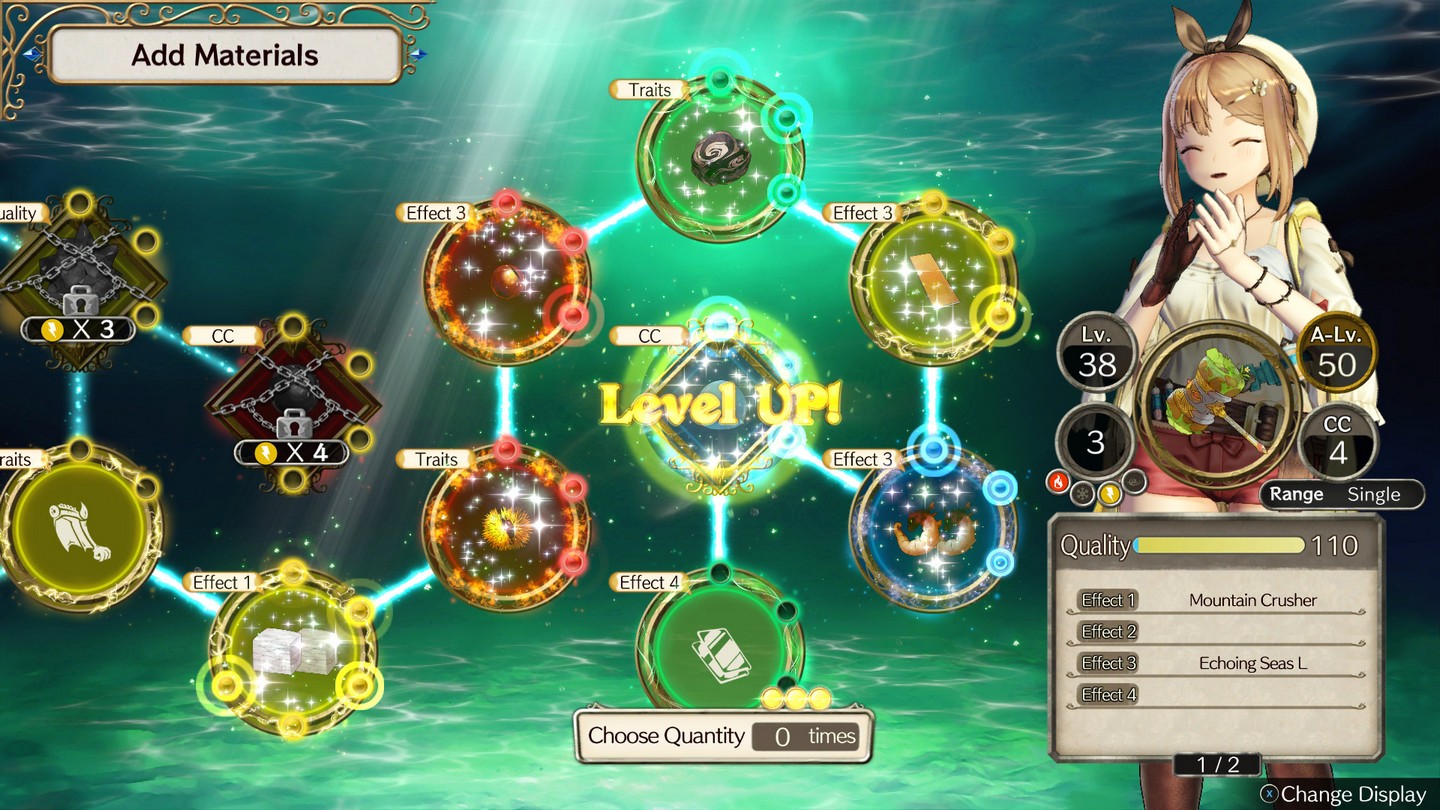
The alchemy system is deep and offers a ton of customization.
It wouldn’t be an Atelier game without an alchemy system, and the one present is one of the best the series has to offer. Instead of just buying new recipe books, most of the alchemy recipes are learned simply by changing up old recipes with new materials.
The alchemy crafting system is laid out in a series of branches, where I could choose to focus on giving the item specific traits not just by the materials that are being used to synthesize it but also by the path that I decide to take the item creation through. It’s easy enough to make an item of decent quality that does what you expect it to do, but really planning ahead with the right materials and path through a synthesis tree feels like solving a puzzle and the results are often more than worth it.
For example, I could use the auto create function to make a bomb and materials would fill in automatically, but the resulting item would do something like 50 damage. If I were to take my time, really cherry picking the materials while going through the right branches while making this bomb, it would result in the same bomb but this one would do something like 500 damage instead.
As my alchemy level grew, I was able to add more and more items and eventually I unlocked the ability to make copies of previously crafted items, which opened the floodgates for some equipment/items that would let me utterly destroy most enemies in a single hit.
Even though getting stronger through alchemy was wholly satisfying, the act of gathering materials felt more like a chore than usual, thanks to the introduction of gathering tools. Getting different items from a collectable point based on if you used an axe, scythe or a hammer makes sense but it also makes it so you have to gather way too many different types of material. It’s a simple matter to instantly teleport back to the Atelier to deposit materials in the stash, but having to make multiple trips back and forth became the norm until much later in the game.
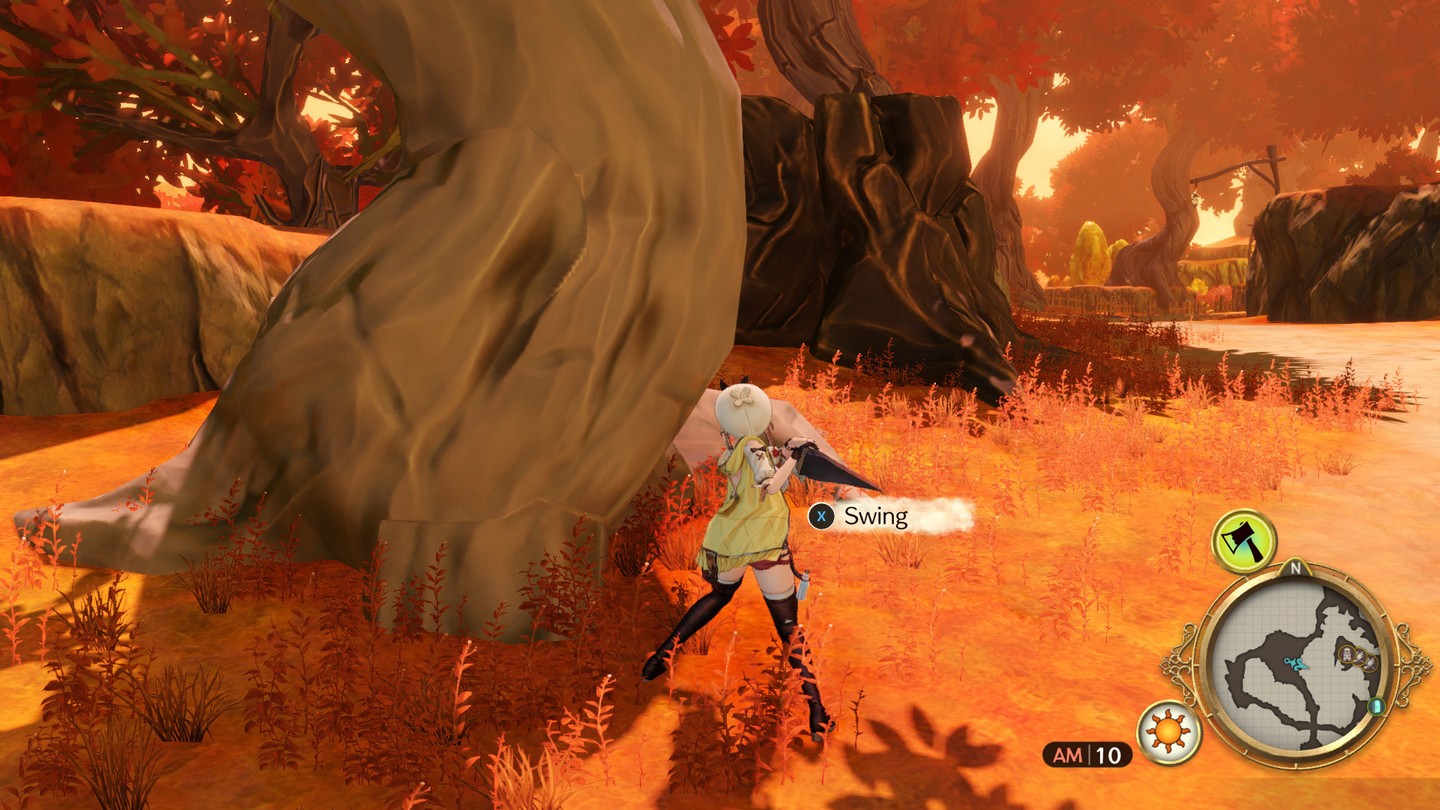
I dream of an Atelier game with infinite bag space.
In fact, just like how the gathering is a bigger chore than it needs to be, so is progressing the story. Despite time not being an important mechanic like it was in the Arland trilogy, the game would often ask me to pass a day or two and then go to a specific place to trigger the next story scene. This would lead me to go back to the atelier, sleep and sleep again then teleporting to the place in question. Then, after seeing a short cut scene, I would be asked to wait another day before triggering the next event which would mean I would once again go back to the atelier to sleep again.
It’s true that time also passes while doing other activities, but there comes a time when I just want to get through a chunk of the story after becoming content with my current power level, but this constant stoppage became hugely annoying and killed whatever momentum the story had in some key plot points. Why the story events weren’t simply tied to locations regardless of time is beyond me.
In a bid to move the series forward towards a new direction, Atelier Ryza presents a new exciting combat engine and one of the best takes on alchemy yet, but falters with its plodding pace and a cast of forgettable characters.
Fun Tidbit – I get that Ryza’s revealing attire and buxom figure is prime bait for fan artists but I have a hard time understanding the extent at which she blew up as a character design.
Review copy of game provided by publisher.
